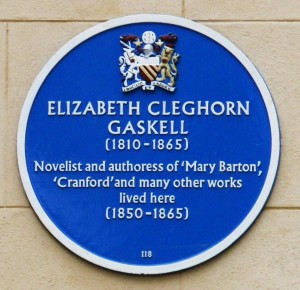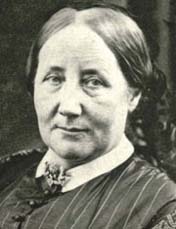The influential figure of Elizabeth Gaskell was at the heart of one of our most celebrated literary circles but her novels were eclipsed in the century following her death by her contemporaries including Charles Dickens and Charlotte Bronte.
Thankfully, partly due to films and television, her work is getting the recognition it deserves. Now the life and works of ‘Mrs Gaskell’ are to be celebrated and preserved for – unbelievably – the first time thanks to a fundraising campaign that secured £1.8m funding to restore her family home.
The Grade II* property is in Manchester and is a rare surviving example of a suburban villa. It will be used as a centre for the understanding of Gaskell’s cultural and literary heritage as well as complementing the city’s social and political history already richly documented there. Born in London (in what is now the grand Cheyne Walk) Elizabeth’s mother died when she was just 13 months. Her father William Stevenson married again when Elizabeth was four, and her stepmother Catherine Thomson was a sister of the Scottish miniature artist, William John Thomson, who painted a famous portrait of Elizabeth in 1832. Elizabeth was brought up by her aunt in Knutsford, which became the setting for the fictional Cranford. The author lived in the house with her husband Reverend William Gaskell, a Unitarian minister and a pioneer in the education of the working class, and her daughters Julia and Meta.
It was William who encouraged her to start writing as a way of dealing with her grief following the death of their only son who had succumbed to scarlet fever. Mary Barton was the result; and its social and indu
strial themes caught the attention of Dickens and other great literary figures of the age, many of whom visited the family home in Plymouth Grove, which Charlotte Bronte described as ‘a large, cheerful, airy house, quite out of (the) Manchester smoke’.

Elizabeth died in 1865 at the house, which remained the family home until Meta’s death in 1913, when it was sold, contents et al. Part of the restoration scheme involved meticulous research into what was in the house and how it had looked when the family resided there – including the gardens which have been subjected to the same detailed renovation. Expect a lively and varied programme of events when it opens this October.
Janet Allan, Chair of The Manchester Historic Buildings Trust, said: ‘I am delighted that after a sustained fundraising campaign and extensive restoration work, Elizabeth Gaskell’s House will finally re-open its doors in October. We are looking forward to offering a welcoming and immersive experience for visitors already familiar with the novels of Elizabeth Gaskell as well as for the communities that we count as our neighbours here on Plymouth Grove.’
Visitors will have the chance to sit in William Gaskell’s study, browsing the specially created library of period books or linger in the dining room where Elizabeth frequently wrote. Artefacts, facsimiles of Elizabeth’s original manuscripts and interpretation focusing on the lives and works of Elizabeth Gaskell and her family will examine and explore the cultural and social context of the period; the changing roles of women will be featured; the history of Manchester and Victorian Britain, Unitarianism with its impact on the family and its wider social impact, daily life at Plymouth Grove as well as the recent restoration process, will also be featured.
Sara Hilton, Head of Heritage Lottery Fund for the North West, said: ‘We have been delighted to support this project to repair, restore and conserve for the enjoyment and education of future generations the home where one of the 19th century’s most important female writers lived during the time she wrote some of her best loved novels.’ The restoration has been achieved through the hard work and determination of The Gaskell Society, which won support from English Heritage, The Foyle Foundation, J Paul Getty Jr Charitable Trust, among others.
For further details of the house visit www.elizabethgaskellhouse.co.uk Get involved: the House is looking for volunteers and support. To find out how you can help contact John Williams, Project Manager atjohn@1001thelock.com IP



